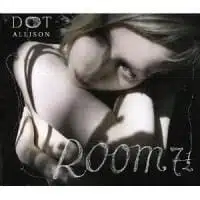
It’s somehow appropriate that the first words on Dot Allison’s latest disc are, “You are frozen / you are fire”, because her voice sounds like frozen fire. Allison sings with a cold passion. Her vocals burn through the mix whether she’s expressing the pain of calamity from the perspective of the gal who ruined your dreams of romance or from the one who was the victim of someone else’s cruelty. In both cases, Allison conveys a distancing of emotion, a numbness, caused by too many life experiences. She’s not the naïf, but the old hand who knows better.
You can find this in the lyrics, where she sings about being everything from a lowly whore who wants to pretend she can woo a man away from his wife to a roguish villain who died for the money in his pockets. The best evidence can be found in the delicateness of her voice. It seems to have the tensile strength of hardened steel. Consider her duet with Pete Doherty, the bluntly titled “I Want to Break Your Heart”. The song begins with a gently strummed off-key and off-kilter acoustic guitar while Allison plays the glockenspiel. In a quiet, breathy voice she gleefully sings, “The pain I brought to you / It was so easy to do.” If one weren’t listening carefully, one would presume she’s cooing words of love. Allison delights in the hurt she brought. “I know you have suffered / cried tears in my name / now you’ll never recover.” The fragility of her expression serves to underscores her ecstasy at breaking her man’s heart, which is further emphasized by Doherty’s lame declarations of love. “I wanna be your man….I wanna hold your hand….I wanna be your dog,” he sings. From the Rolling Stones to the Beatles to Iggy and the Stooges, he debases himself in a matter of seconds, leaving no doubt that Allison is in charge.
Even when she’s the victim, such as the alcoholic, drug-addled mistress of the title track, Allison’s voice makes it clear she’s still the boss. She might need the whiskey to get herself started, but don’t mistake the vulnerability in her voice for real vulnerability. She lets the listener know she’s just playing a role to get what she wants. Allsion carefully annunciates the desire for peace of mind that lies at the roots of her addictions. On this song, as on the others, the instrumentation colors the music but never really intrudes on her performance. She again plays glockenspiel, and also abets herself on autoharp. The rest of the accompaniment (James Johnson on harmonium, organ, etc., Terry Edwards on trumpet, saxophone, bass, Rob Ellis on drums and percussion) adds a layered atmosphere to what happens. For the most part, there are no notable solos. Only thick, rich strata of sounds and noises that fog the speakers like smoke pots on a stage.
The two or three folk-like songs seem a departure for the former electronica star. “Jonny Villain” comes off as a Bertholt Brecht/Kurt Weill cabaret-style morality tale. The first half of “Portrait of the Sun” is an autumnal love song that blossoms into a noise fest as love fades away. On Allison’s duet with Paul Weller, “Love’s Got Me Crazy”, they croon in unison to a lovely and lilting acoustic accompaniment, until it becomes clear that the duo may actually be insane. Is this love? Does it matter? The point seems to be that love is delusional and lovers can’t be trusted. The duo don’t seem happy, just nuts, and the simple accompaniment reinforces the simplicity of this ironic fact.

